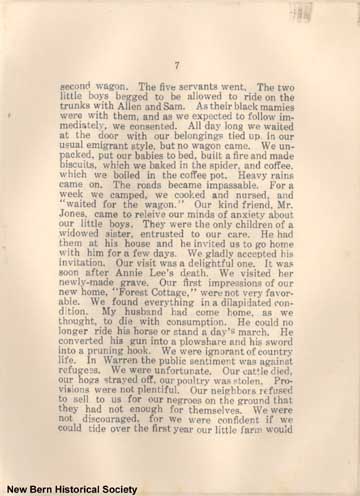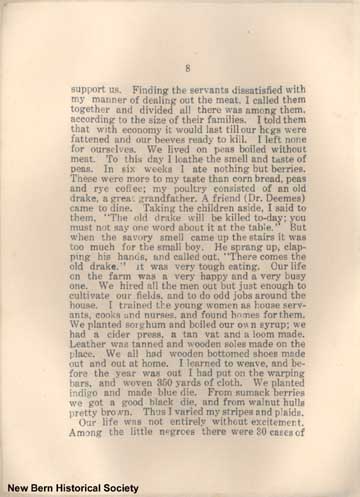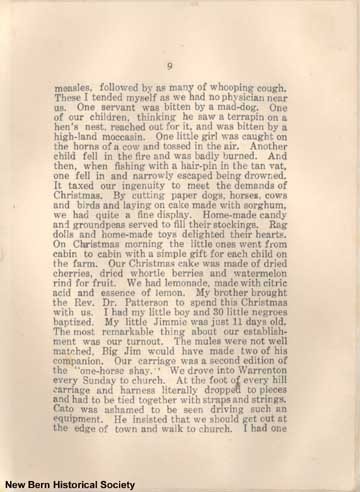
Historical Incidents by Mrs. F.C. Roberts,
Part 3
Click on the page images to view a more detailed image.
 |
7 second wagon. The five servants went. The two little boys begged to be allowed to ride on the trunks with Allen and Sam. As their black marries were with them, and as we expected to follow immediately, we consented. All day long we waited at the door with our belongings tied up in our usual emigrant style, but no wagon came. We unpacked, put our babies to bed, built a fire and made biscuits, which we baked in the spider, and coffee, which we boiled in the coffee pot. Heavy rains came on. The roads became impassable. For a week we camped, we cooked and nursed, and “waited for the wagon.” Our kind friend, Mr. Jones, came to releive our minds of anxiety about our little boys. They were the only children of a widowed sister, entrusted to our care. He had them at his house and he invited us to go home with him for a few days. We gladly accepted his invitation. Our visit was a delightful one. It was soon after Annie Lee’s death. We visited her newly-made grave. Our first impressions of our new home, “Forest Cottage,” were not very favorable. We found everything in a dilapidated condition. My husband had come home, as we thought, to die with consumption. He could no longer ride his horse or stand a day’s march. He converted his gun into a plowshare and his sword into a pruning hook. We were ignorant of country life. In Warren the public sentiment was against refugees. We were unfortunate. Our cattle died, our hogs strayed off, our poultry was stolen. Provisions were not plentiful. Our neighbors refused to sell to us for our negroes on the ground that they had not enough for themselves. We were not discouraged, for we were confident if we could tide over the first year our little farm would
|
||
 |
8 support us. Finding the servants dissatisfied with my manner of dealing out the meat, I called them together and divided all there was among them. according to the size of their families. I told them that with economy it would last till our hogs were fattened and our beeves ready to kill. I left none for ourselves. We lived on peas boiled without meat. To this day I loathe the smell and taste of peas. In six weeks I ate nothing but berries. These were more to my taste than corn bread, peas and rye coffee my poultry consisted of an old drake, a great grandfather. A friend (Dr. Deemes) came to dine. Taking the children aside, I said to them, “The old drake will be killed to-day; you must not say one word about it at the table.” But when the savory smell came up the stairs it was too much for the small boy. He sprang up, clapping his hands, and called out, “There comes the old drake.” It was very tough eating. Our life on the farm was a very happy and a very busy one. We hired all the men out but just enough to cultivate our fields, and to do odd jobs around the house. I trained the young women as house servants, cooks and nurses. and found homes for them. We planted sorghum and boiled our own syrup; we had a cider press, a tan vat and a loom made. Leather was tanned and wooden soles made on the place. We all had wooden bottomed shoes made out and out at home. I learned to weave, and before the year was out I had put on the warping bars, and woven 350 yards of cloth. We planted indigo and made blue die. From sumack berries we got a good black die, and from walnut hulls pretty brown. Thus I varied my stripes and plaids. Our life was not entirely without excitement. Among the little negroes there were 30 cases of
|
||
 |
9 measles, followed by as many of whooping cough. These I tended myself as we had no physician near us. One servant was bitten by a mad-dog. One of our children, thinking he saw a terrapin on a hen's nest, reached out for it, and was bitten by a high-land moccasin. One little girl was caught on the horns of a cow and tossed in the air. Another child fell in the fire and was badly burned. And then, when fishing with a hair-pin in the tan vat, one fell in and narrowly escaped being drowned. It taxed our ingenuity to meet the demands of Christmas. By cutting paper dogs, horses, cows and birds and laying on cake made with sorghum, we had quite a fine display. Home-made candy and groundpeas served to fill their stockings. Rag dolls and home-made toys delighted their hearts. On Christmas morning the little ones went from cabin to cabin with a simple gift for each child on the farm. Our Christmas cake was made of dried cherries, dried whortle berries and watermelon rind for fruit. We had lemonade, made with citric acid and essence of lemon. My brother brought the Rev. Dr. Patterson to spend this Christmas with us. I had my little boy and 30 little negroes baptized. My little Jimmie was just 11 days old. The most remarkable thing about our establishment was our turnout. The mules were not well matched, Big Jim would have made two of his companion. Our carriage was a second edition of the “one-horse shay.” We drove into Warrenton every Sunday to church. At the foot of every hill carriage and harness literally dropped to pieces and had to be tied together with straps and strings. Cato was ashamed to be seen driving such an equipment. He insisted that we should get out at the edge of town and walk to church. I had one
|
||
| Pages 1 through 3 | Pages 4 through 6 | Pages 7 through 9 | Pages 10 through 12 |
| Pages 13, 14 and end pages | |||
Return to:
Craven County Digital History Exhibit
Return to: New Bern Historical Society Section of
Digital History Exhibit
Return to:
Kellenberger Room
Images scanned by John B. Green, III. Text prepared by
John B. Green, III and Victor T. Jones, Jr.
This page last edited on
August 21, 2018.



